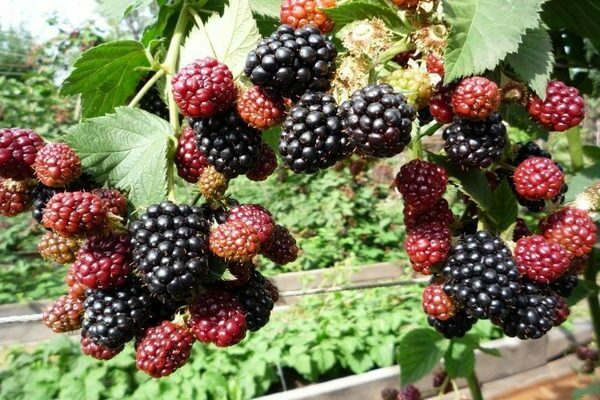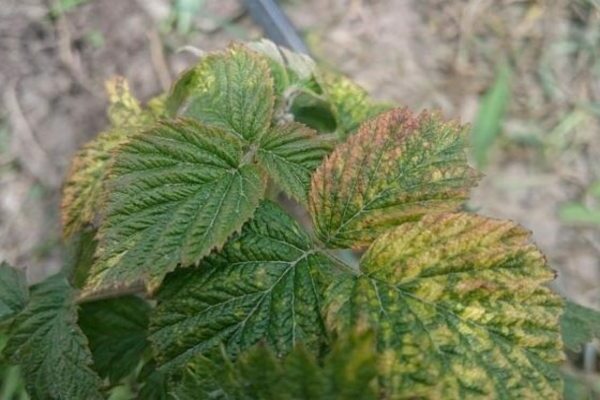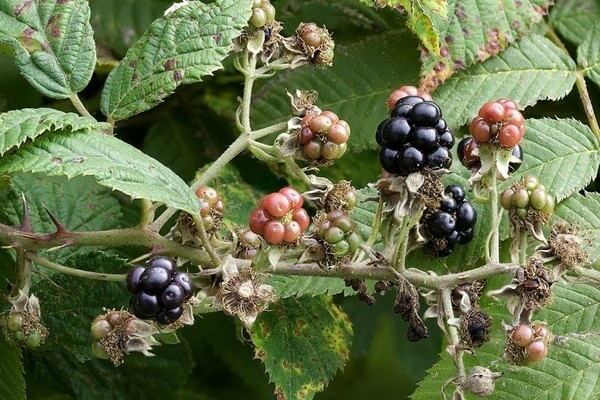Why blackberries do not bear fruit
Content:
Blackberries are considered to be a fairly unpretentious plant that can successfully bear fruit even in the northern regions. In Russia, this shrub is very popular for its taste, many gardeners love it. Life in the wild has taught the blackberry to adapt to any conditions. It gives a consistently good harvest, but there are situations when there are no berries or are so small that it becomes very difficult to collect them. In this article, we will try to figure out why blackberries do not bear fruit.
Why garden blackberries do not bear fruit - reasons

Below are the main reasons why blackberries do not bear fruit.
Features of the variety
It's no secret that the success of the harvest primarily depends on the right variety. Blackberries include more than three hundred varieties, they are divided into erect, semi-erect and creeping.
It is the erect ones that are considered the most fruitful, they are just the most popular among gardeners, they form clusters with many berries and yield a harvest in kilograms. But the creeping ones have very large fruits. The worst harvest is given by hybrid varieties, but they are appreciated for their taste, in which there is no astringency.
Why blackberries do not bear fruit - due to neglect of the rules of agricultural technology
First, the blackberries need to be covered for the winter. Although blackberries are considered a frost-resistant shrub, they nevertheless require shelter for the winters, otherwise the shoots will simply freeze, and in the worst case, kidney necrosis is formed. Naturally, under such circumstances, the blackberry will not bear fruit. You should also pay attention to pruning branches.
You need to remove only those branches that will definitely not bear fruit, they are either old or dry and prevent new shoots. Blackberries are a two-year-old shrub, that is, fruiting occurs on last year's shoots. That is, it turns out that if we remove these shoots, we will not get a crop, so we carry out pruning very carefully. Therefore, it is recommended to do pruning only in the fall, and if you prune new shoots in the spring, then you should not expect any harvest this year.
Watering and feeding
Irregular and insufficient watering of the bush can also lead to a lack of harvest, especially in dry times. During the ripening of the berries, regular watering is required if there is no rain. Watering must be done carefully, avoiding moisture on the berries.

It is necessary to take care of the garter of the branches in a timely manner, because the fruits that have fallen to the ground are not recommended to be eaten. Berries that have fallen to the ground quickly rot and mold, so they need to be tied to a support in a timely manner so as not to lose part of the harvest. Due to a lack of moisture, blackberries can become small and dry or not ripen at all.
But also an excess of moisture will lead to rapid decay of the fruit. Also, to improve yield indicators, it is very important to make seasonal fertilizing. In order for the berries to be tasty, large and juicy, potash fertilizers must be applied.
In the fall, you can feed with potassium-phosphorus fertilizers. Organic matter, humus and ash are also introduced: they need to be buried in trenches dug in the aisles. Ash is fertilized only once every three years. In spring and summer, complex fertilizers are best suited; you can also spray with urea.
Lack of flowering
The lack of flowers also indicates that the harvest is not expected. The reasons may be different, including the fact that the kidneys froze without shelter for the winter. The consequence will be that empty vines will interfere with the fruit of others.
Why blackberries do not bear fruit - because the plant was planted in the wrong place
The wrong planting site will also cause crop failure. For example, an insufficiently lit place is not suitable for blackberries, the fruits will not ripen. Wetlands are not suitable for planting shrubs. Excess moisture in the soil will sooner or later lead to the extinction of the entire plant, it will die without even having time to give a crop.
Acidic soil is also not suitable for blackberries, the soil should be neutral or slightly acidic. Acidic soil will lead to foliar chlorosis.
Climate as one of the reasons
The unsuitable climate is probably the main reason for the lack of crops. The thing is that this plant has a very long growing season, unlike its relative, raspberries, it is a month late, so it may simply not have time to ripen before the onset of cold weather. Flowers appear only in July, then two months later the berries themselves, and if it so happened that the autumn turned out to be cold, then naturally there will be no fruits.
Ways to deal with crop failure

In order to preserve and receive a consistently high yield, you need to follow the elementary rules for caring for blackberries, taking into account all the reasons given above. For example:
- when watering the plant, do not allow moisture to get on the fruits. Brushes with berries should not touch the ground, and you should not eat such berries, because there is a high probability that they are already infected with gray rot. You should forget about fruiting, because the next problem will be the fight against rot.
- to grow blackberries, it is necessary to apply all fertilizers in a timely manner, focusing on the condition of the soil, climatic and other features of the development of the shrub. If you do not fertilize your shrub at all, then there is a high probability that the yield will be absent or the berries will become smaller. The introduction of fertilizers and minerals also significantly affects the taste of blackberries.
- the very first thing you should do is choose the right variety that is right for your region. Breeders have not bred such varieties of blackberries that would bear fruit abundantly and be large, therefore, before choosing one or another variety, you need to take into account your own preferences.
- when planting, you need to choose the right place, sufficiently lit, a little shading is allowed. Particular attention must be paid to the garter of the fruit-bearing branches, as we have already said, the fruits should not be allowed to lie on the ground. We tie it up to a height of two meters. As for the distance between bushes, these recommendations should be read for each variety separately.
- if suddenly it so happened that you planted a shrub on calcareous soil, the situation can be corrected as follows. First, you need to make a foliar top dressing of iron chelate and add a weak solution of ferrous sulfate under the root. Such soil requires constant feeding of manure and humus, preferably in spring and autumn.
Observing all these simple rules for caring for blackberries, you can provide yourself with tasty and very healthy berries for many years, given that blackberries bear fruit for up to 15 years in one place.

